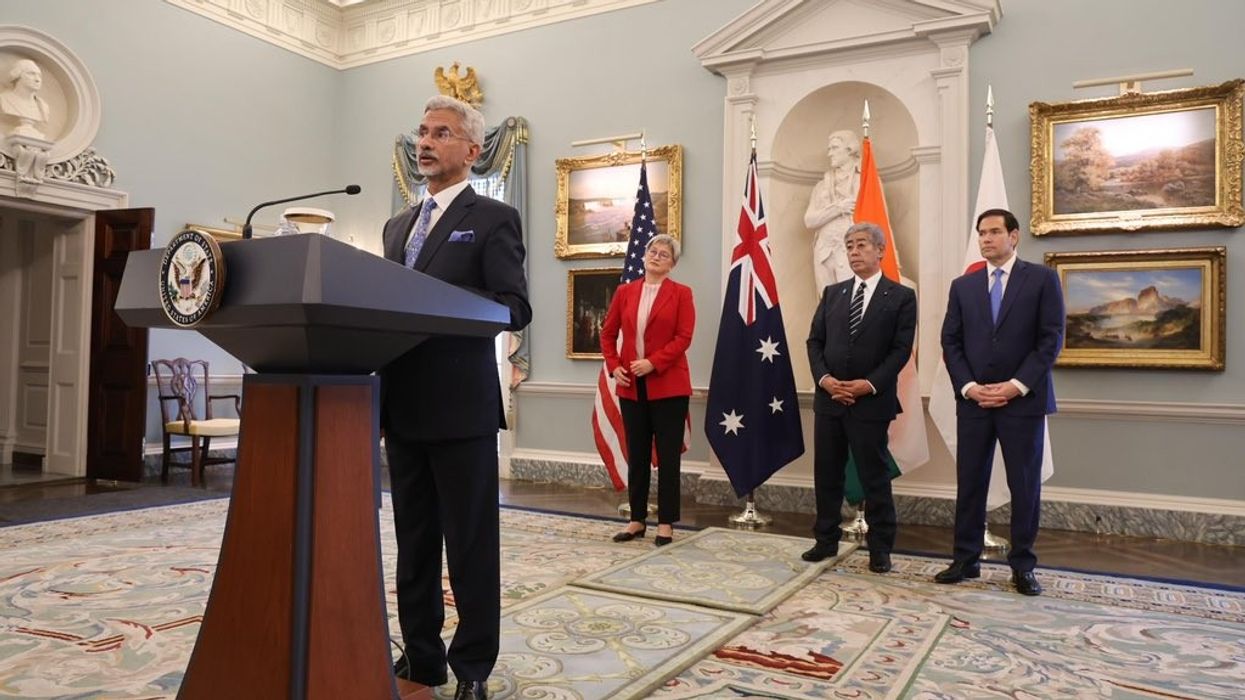THE QUAD grouping has called for the perpetrators, organisers and financiers of the Pahalgam terror attack to be brought to justice without delay. The group also urged all UN member states to cooperate in the process.
The foreign ministers of the Quad — India, the US, Australia and Japan — met in Washington DC on Tuesday to outline priorities for the bloc’s annual summit to be held in India later this year.
In a joint statement, the ministers condemned the April 22 attack in strong terms and called for firm action against cross-border terrorism. The statement did not mention Pakistan or the four-day military conflict between Indian and Pakistani forces in May.
Condolences and call for justice
“We express our deepest condolences to the families of the victims and extend our heartfelt wishes for a swift and full recovery to all those injured,” the ministers said.
“We call for the perpetrators, organisers, and financiers of this reprehensible act to be brought to justice without any delay and urge all UN Member States, in accordance with their obligations under international law and relevant UN Security Council Resolutions, to cooperate actively with all relevant authorities in this regard,” they said.
The meeting was attended by India's External Affairs Minister S Jaishankar, US Secretary of State Marco Rubio, Australian Foreign Minister Penny Wong and Japanese Foreign Minister Takeshi Iwaya.
Concerns over maritime security and China’s actions
The ministers also expressed serious concern over growing military activity in the East China Sea and South China Sea. Without naming China directly, they said, “We reiterate our strong opposition to any unilateral actions that seek to change the status quo by force or coercion.”
They referred to “dangerous and provocative actions, including interference with offshore resource development, the repeated obstruction of the freedoms of navigation and overflight, and the dangerous manoeuvres by military aircraft and coast guard and maritime militia vessels.”
In this context, they pointed to “unsafe use of water cannons and ramming or blocking actions in the South China Sea”, saying such actions threaten peace and stability in the region.
“We are seriously concerned by the militarisation of disputed features. We emphasise the importance of upholding freedom of navigation and overflight, other lawful uses of the sea, and unimpeded commerce consistent with international law, as reflected in the United Nations Convention on the Law of the Sea (UNCLOS),” the ministers said.
They said that maritime disputes should be resolved peacefully and in line with international law. They also underlined the 12 July 2016 ruling by the Arbitral Tribunal, calling it a “significant milestone and the basis” for settling disputes between the parties. The tribunal had ruled against China’s claims in the South China Sea in a case filed by the Philippines.
Supply chain reliability and critical minerals
The Quad ministers also raised concern about the “abrupt constriction and future reliability” of global supply chains for critical minerals, referring to China’s role in the sector.
“This includes the use of non-market policies and practices for critical minerals, certain derivative products, and mineral processing technology,” the statement said.
They stressed the need for diversified and reliable supply chains. “Reliance on any one country for processing and refining critical minerals and derivative goods production exposes our industries to economic coercion, price manipulation, and supply chain disruptions, which further harms our economic and national security,” they said.
The Quad also announced plans to launch a “Quad Ports of the Future” partnership in Mumbai later this year.
Myanmar crisis and regional stability
The foreign ministers expressed concern over the “worsening crisis” in Myanmar and its regional impact.
“We call on the regime to adhere to its commitment to a ceasefire, and call on all parties to implement, extend and broaden ceasefire measures,” they said.
“We reaffirm our strong support for ASEAN’s efforts, including calling for the full and effective implementation of the Five Point Consensus in seeking an inclusive, durable, and peaceful resolution to the crisis,” they said.
The statement also called on all sides to allow safe and unhindered humanitarian assistance. “We are also concerned about the impact of the crisis on regional security and the spread of transnational crimes,” the ministers added.
(With inputs from agencies)





